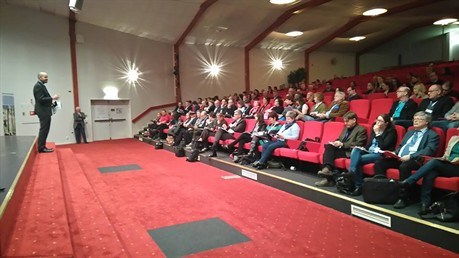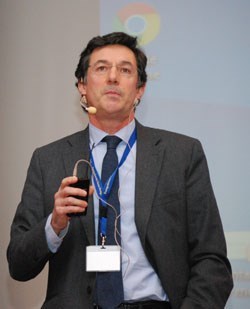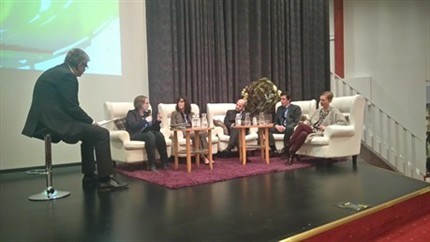OECD-seminar with the NSPA in Piteå
Following months of preparation, the long awaited OECD-visit in the northernmost parts of Sweden has finally taken place, starting with a bus-tour through the regions on February 22 to meet with numerous regional representatives, and ending five days later with a seminar held in Piteå - attended by almost 300 people.
The participants consisted of both local representatives from the 14 regions of the NSPA and officials from the Swedish Ministry of Enterprise, the Swedish Agency for Growth and the European Commission - as well as the OECD-team itself, with experts from the Quebec Regions and the University of Kentucky. This was a part of the ongoing work conducted by the OECD at the request of the NSPA (Northern Sparsely Populated Areas) to create a territorial review of the 14 northernmost regions of Sweden, Finland and Norway, that aims to analyse the specific regional challenges and opportunities in terms of long-term growth potential and development.

After an introduction by Mikael Janson, director of the North Sweden European Office, and some words of welcome from Erik Bergkvist, chair for the European Forum Northern Sweden (EFNS), the seminar was opened by José Enrique Garcilazo, project leader for the Regional Development Policy Division at the OECD and the person in charge of the territorial review, who discussed the unique possibilities and challenges facing so-called "low-density economies" and the increasing integration of rural and urban areas, as well as important drivers for growth. He also mentioned three principles for place-based policies, namely using regional specific assets and smart specialization, creating complementarities among policies at the regional and local level and employing a multi-level governance approach in order to align practical implementation measures with regional objectives. "The northern regions of Sweden face tough challenges. Vast distances, climate change, an ageing population and the struggle to keep the right competence in the region at the same time as the youth unemployment is high. The regions have to become more efficient and find smart solutions that allow more to be done with less resources", José Enrique concluded.
This was then followed by David Freshwater, professor of rural policy and public policy from the University of Kentucky and part of the OECD team, who argued that political provision of public services in rural areas and labour market policies that aim to ease the matching between labour supply and demand are two vital parts of any strategy to increase the competitiveness of rural areas. "The regions that have more and better public services are abler to make people stay. If a region cannot create employment for younger individuals, the young will have no good reason to stay", David said.
Sverker Lindblad from the Swedish Ministry of Enterprise, who is responsible for a longitudinal study on demographic development in Sweden, then continued the seminar by discussing the current and future challenges that arise when the dependency ratio changes, i.e. when a shrinking workforce has to provide the required tax-base. An important conclusion was that ambitious measures to increase the rate of employment - especially, among younger people, those with a migrant background - could be one important but partial solution.
The following speaker was Stephane Pronovost, chief of research at Canada Economic Development for Quebec Regions and also part of the OECD team, who among other things mentioned the importance for rural regions of providing structures that promote a friendly business climate, foster cooperation and exchange of know-how as well as best-practices between different actors and sectors. "There is no one-size-fits-all model, strategies have to be developed based on existing local needs." Stephane said. Erik Bergkvist, chairman of EFNS and Risto Poutainen, Regional Council of North Karelia, also commented briefly, adding among other things that the political approach needs to be coordinated since there are currently several overlapping structures for regional development.
Marie-Chantal Girard, Vice-President for Policy and Communication at Canada Economic Development for the Quebec Regions, then discussed the case of Quebec. The Quebec Regions face several challenges of similar nature in terms of regional development; and Marie-Chantal proposed that successful policies must be built on collaborative efforts of diverse stakeholders and innovative investments in resources where the regions have comparative advantages. "We need a strong leadership in all levels of governance to foster regional development", Marie-Chantal argued.
The seminar was then divided into three parallel panels that focused on varying themes and subjects. The first discussed how to develop skills and attract the right competences to support growth, moderated by Abel Schumann from the OECD with Anne Åberg from Akademi Norr and Veikko Seppänen from the Martti Ahtisaari Institut and Leif-Gunnar Hanssen, from Narvik Science Park. The second focused on how to deliver innovative services in response to demographic change, moderated by Chris McDonald from the OECD, with Agneta Granström from Norrbotten County Council and Maarit Sireni from the University of East Finland. The theme of the third seminar was how to build the capacity and leadership to support better governance and decision-making, moderated by José Enrique Garcilazo and attended by Christer Fröjdh from the Mid Sweden University and Kristiina Jokelainen from the Regional Council of Lapland.

José Enrique Garcilazo took the stage once again to open the afternoon session. He made the statement that the OECD had focused for many years on cities; pointing out that low-density rural communities could be as innovative as urban areas, he said that their potential was often neglected. Marie-Chantal Girard followed up with examples of such communities in rural Quebec, and reflected on how regional growth must be fostered in a rural context.
Mikel Landabaso, Director for Urban and Territorial Development on DG REGIO at the European Commission, then argued that all of Europe faces the same challenge: to achieve higher rates of employment in order to counter a rapidly changing demographic structure. "Cohesion policy can, if applied in the right way to support smart regional specialization, be a part of the solution", he proposed. Smart specialization is not a planning doctrine, but an approach to policy that focuses on already existing regional strengths that can benefit R&D and innovation. By matching R&D-potential with business needs through a diverse composition of stakeholders, regions can specialize and foster future growth.
Finally, Gunnilla Nordlöf, the director-general for the Swedish Agency for Growth, informed that the two main future areas of focus for the agency will be how to enable regional growth and development and how to increase the competitiveness of small and middle-sized businesses. "We need to cooperate, we cannot solve all challenges on our own", she concluded.

The seminar ended with a concluding panel discussion between the participants at the OECD seminar and Maria Stenberg, rapporteur European Forum Northern Sweden (EFNS), representing the regional level, and was thereafter integrated with the EFNS conference.
Everyone was then warmly invited to the next NSPA forum on the 9-10 June in Mikkeli, Finland.
The speakers' presentations:
JOINT OECD PANEL: Demographic Trends and Service Delivery
David Freshwater, University of Kentucky: Demographic and Economic Trends, Service Delivery and Community Viability
Sverker Lindblad, Senior Adviser, Swedish Ministry of Enterprise: Demographic Challenges in Swedish Regions to 2040
Stephane Pronovost, Chief of Research, Canada Economic
Development for Quebec Regions: Demographic Trends and Service
Marie-Chantal Girard, Vice-President - Policy and Communications, Canada Economic Development for Quebec Regions: Demography, Service Delivery and Supply of Competence
THREE PARALLEL OECD PANELS
Seminar 1: Developing skills and attracting competencies to support growth
Anne Åberg, Akademi Norr : Akademi Norr: Learning, Development, Competence
Veikko Seppänen, Martti Ahtisaari Institute: Developing skills and attracting competencies to support growth
Leif-Gunnar Hanssen, Narvik Science Park, Harmonization of Vocational Education at the North Calotte
2. Rural service delivery innovation in response to demographic change
Agneta Granström, Norrbotten County Council: Presentation
3. Leadership and capacity building to support better governance and decision making
Kristiina Jokelainen, Regional Council of Lapland: Smart Use of Arctic Natural Resources and Conditions in the Northest Region of Finland and EU
Christer Fröjdh, Mid Sweden University, The university and regional development
COMMENTS BY THE OECD EXPERTS
Stephane Pronovost
Marie-Chantal Girard
PROGRAM NSPA AFTERNOON SESSION; START-UP SESSION EUROPEAN FORUM NORTHERN SWEDEN
Mikel Landabaso, Director Inclusive Growth, Urban and Territorial Development and Northern Europe, DG Regio, EU Commission: EU perspectives on smart regional growth
Smart specialization video
Marie-Chantal Girard, Vice-President - Policy and Communications, Canada Economic Development for Quebec Regions: Canadian strategies for regional development, the Quebec case
